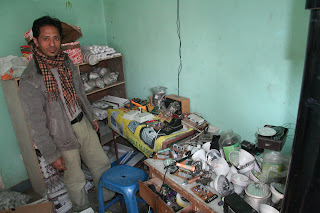In Nepal, those without access to electricity generally rely on kerosene wick lamps (in 2.4 million households). This form of lighting is neither cost-effective nor environment-friendly. Fumes from the kerosene lamps affect the eyes and lungs and contribute to global warming due to the release of greenhouse gases. The quality of light is inferior and there is a high risk of accidental fire. Additionally, since kerosene has to be imported the government has to spend its limited foreign currency.
I am working with Nepali energy firms and NGO's that are developing these small household solar lamps. One group working on this issue is ECCA Nepal. This group has been very successful in distributing the technological know-how and awareness of these lamps across rural areas of Nepal. Microfinance mechanisms are in place for villagers to buy the lamps and solar panels on monthly installments increasing the amount of people able to purchase clean light.

Students studying at night with the help of the Solar Tuki.
The Solar Tuki and its solar panel. Two lamps and a solar panel cost the equivalent of about 50 USD.
ECCA works to train independent manufacturers and service technicians so that the Solar Tuki success story can be spread across Nepal. Even just a small amount of money can go a very long way to providing light to someone in need. During this holiday season give the gift of light.
Donations are accepted through Global Giving (click HERE to donate).
These lights are made in an impressively small 'factory.' Below are some images from the assembly point in Kathmandu.
The manager of the warehouse, Rajan.



What an important contribution you are making both to Nepal and to the world. Change starts by grassroots entreprises and your blog helps follow up on your inspired work. I am so proud of you.
ReplyDeleteG